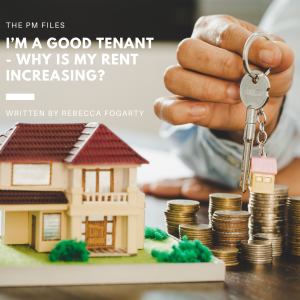I’M A GOOD TENANT, WHY IS MY RENT INCREASING?

One of the biggest disputes we see as a property manager is over rental increases. We often hear:
“I’m a good tenant, I pay rent on time and keep the property clean – why are they increasing the rent?”
Or we hear:
“The owners haven’t done anything to improve the property to increase the rent.”
To tenants, these are valid points but from an owner’s perspective they see things differently so we hope that this blog provides our tenants with some information on the how and why rent increases occur and how they are calculated.
Paying your rent on time and keeping the property clean and tidy is a tenant obligation, it’s not over and above what you agreed to and signed on a tenancy agreement, it’s meeting your minimum standards. Both the owners and your property manager have a valid expectation that this will occur. In the event rent is not paid on time or you are not looking after the property when it comes time to the lease renewal you are unlikely to be offered a new lease.
Where tenants have been rewarded with a lower rental rate than the market rate is when a tenant improves the property themselves – perhaps reinvigorating the gardens with new plants or mulch, doing minor maintenance like oiling decks or improvements to the property like painting or seals (all with the owner’s approval).
So why does rent increase?
Some tenants think that landlords are cash filled multi-millionaires or businessmen/women just waiting to squeeze the money from their tenants. This couldn’t be farther from the truth.
Most investment owners are mum and dads who buy an investment property so they don’t have to rely on super when they retire or have simply moved from the city to pursue work elsewhere and would like to keep their house if it is financially viable to do so.
These types of landlords make up 90% of the properties we manage. They have mortgages over the property which are fluctuating due to recent rate rises or are fixed. Some owners recently have gone from a fixed rate of 3% and with the fixed term coming to an end have moved to a variable rate of 8%. A standard loan of $400,000 under this scenario has meant an increase of $1,249 per month.
Increased interest rates have also been coupled with rises in insurance, both property and landlord insurance and increases in council and water rates.
So who determines the ‘market rate’?
The RTA release a median rent each quarter which gives us a guideline on what a property should rent for. This is calculated by averaging the total bonds held for that size of property and gives a median. It also separates each suburb or city to give an accurate measurement.
You can check out the latest median rents here – Median rents quick finder | Residential Tenancies Authority (rta.qld.gov.au)
Please bear in mind that this is an average and properties can fluctuate either side depending on the age, presentation and additional features of the property.
The vacancy rate can also affect the market rent – in a period of low vacancy, rents tend to increase however in a period of high vacancy they tend to remain stable or sometime fall slightly.
As a tenant, you can always negotiate the rent and ask for a lower increase. We suggest you provide reasons why the rent increase is not in line with the market or check other available properties in the area to confirm.
We compare the price of available properties in the area and look at the achieved rent for properties in the last few months for each property and make a recommendation to the owner on what a fair market rate is.
The owner may not agree or accept your offer, but this is their choice, just as it is your choice on whether to accept their offer or move out.

